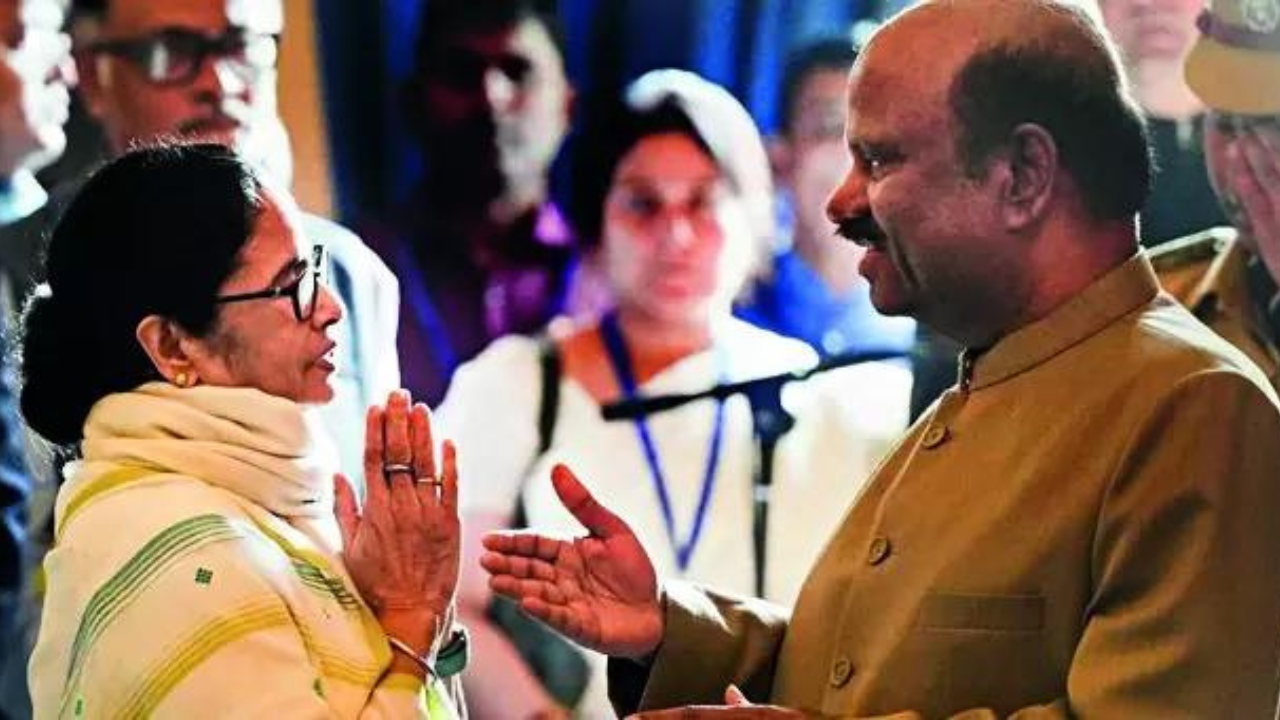[ad_1]
KOLKATA: West Bengal‘s Mamata Banerjee-led Trinamool govt on Friday moved Supreme Court against the governor for stalling eight bills passed by the assembly, six of which are pending for a year and 10 months and two for eight months. The time frame coincides with the tenures of governor CV Ananda Bose, and his predecessor and current Vice-President Jagdeep Dhankar.Seven of the bills pertain to the appointment of vice-chancellors (VCs).
In its plea, the state has contended that a governor “must not be allowed to use pocket veto through the backdoor” when the Constitution does not give him or her such discretionary powers.
This is the latest in the series of Mamata Banerjee govt’s stand-offs with the governor. Banerjee’s ties with Bose have soured to such an extent that she has said that she will not go to Raj Bhawan and will only meet the governor publicly. The Kolkata police has already lodged two FIRs relating to molestation and rape complaints implicating the Raj Bhawan staff, and the governor’s kin, over allegations levelled against governor Bose. In another face-off, the state assembly snubbed the governor with the speaker administering the oath of office to two newly elected MLAs.
There have been instances of other opposition-governed states like Tamil Nadu and Kerala approaching SC against their respective governors in the last few months. In March this year, the Pinarayi Vijayan govt had appealed against Kerala governor Arif Mohammed Khan’s office for keeping four bills pending for a long and indefinite period and later reserving them for the consideration of the President. Earlier, the MK Stalin govt had moved SC against Tamil Nadu govt for delaying crucial bills passed by the legislature.
The 124-page special leave petition (SLP) was mentioned before a bench of Chief Justice DY Chandrachud and Justices JB Pardiwala and Manoj Misra. “The bench said the matter will be heard early,” said Sanjay Basu, Bengal’s senior standing counsel in Supreme Court.
The seven VC-related bills deal with the appointments in state-aided and private varsities. These include the ones in which the CM replaces the governor as state university chancellor and state education minister replaces the governor as “visitor” in private universities.
Six of these bills were passed in June 2022, when Dhankhar was governor. The seventh was passed in Aug 2023 after Bose stepped into Raj Bhavan. It seeks to expand the search-and-selection committee for VC appointment as per UGC norms, but in a manner that gives the majority voice to state nominees.
The only non-education bill cited in the petition is the West Bengal Town and Country (Planning and Development) (Amendment) Bill, 2023, which does away with multiple and often Joverlapping fees for development projects.
State counsel Basu said that the governor withholding consent to the bills was violative of Article 200 of the Constitution and had “precipitated a constitutional crisis” in the state. The statement added that the governor had neither acted on the bills or given any reason for keeping them pending.
In its plea, the state has contended that a governor “must not be allowed to use pocket veto through the backdoor” when the Constitution does not give him or her such discretionary powers.
This is the latest in the series of Mamata Banerjee govt’s stand-offs with the governor. Banerjee’s ties with Bose have soured to such an extent that she has said that she will not go to Raj Bhawan and will only meet the governor publicly. The Kolkata police has already lodged two FIRs relating to molestation and rape complaints implicating the Raj Bhawan staff, and the governor’s kin, over allegations levelled against governor Bose. In another face-off, the state assembly snubbed the governor with the speaker administering the oath of office to two newly elected MLAs.
There have been instances of other opposition-governed states like Tamil Nadu and Kerala approaching SC against their respective governors in the last few months. In March this year, the Pinarayi Vijayan govt had appealed against Kerala governor Arif Mohammed Khan’s office for keeping four bills pending for a long and indefinite period and later reserving them for the consideration of the President. Earlier, the MK Stalin govt had moved SC against Tamil Nadu govt for delaying crucial bills passed by the legislature.
The 124-page special leave petition (SLP) was mentioned before a bench of Chief Justice DY Chandrachud and Justices JB Pardiwala and Manoj Misra. “The bench said the matter will be heard early,” said Sanjay Basu, Bengal’s senior standing counsel in Supreme Court.
The seven VC-related bills deal with the appointments in state-aided and private varsities. These include the ones in which the CM replaces the governor as state university chancellor and state education minister replaces the governor as “visitor” in private universities.
Six of these bills were passed in June 2022, when Dhankhar was governor. The seventh was passed in Aug 2023 after Bose stepped into Raj Bhavan. It seeks to expand the search-and-selection committee for VC appointment as per UGC norms, but in a manner that gives the majority voice to state nominees.
The only non-education bill cited in the petition is the West Bengal Town and Country (Planning and Development) (Amendment) Bill, 2023, which does away with multiple and often Joverlapping fees for development projects.
State counsel Basu said that the governor withholding consent to the bills was violative of Article 200 of the Constitution and had “precipitated a constitutional crisis” in the state. The statement added that the governor had neither acted on the bills or given any reason for keeping them pending.
[ad_2]
Source link



